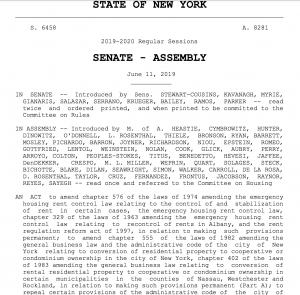According to the New York Times, the new legislation would be changed or abolished. This includes:
- Vacancy decontrol: When the legal rent for a rent-stabilized apartment reached a certain rate, currently $2,774 per month, it could revert to market-rate if there is a vacancy. The rule has led to the deregulation of more than 155,000 units since it was enacted in the 1990s. This practice would be ended.
- The vacancy bonus: Landlords for rent-stabilized apartments have been able to hike rents by as much as 20 percent after tenants moved out. The new rules would prevent that.
- Limiting rent hikes based on building improvements: Landlords have been able to increase rents in regulated apartments by up to 6 percent per year if they made improvements that “directly or indirectly” benefited all tenants, such as a new boiler. That increase would now be capped at 2 percent per year. Rent hikes that were permitted if landlords renovated or improved individual apartments would also now be limited.
- Protecting tenants with “preferential” rents: Landlords of rent-stabilized apartments can offer units to tenants for a price lower than the legal regulated rent. But they can no longer raise the rent to the legally mandated limit when a lease is renewed, a practice that was pushing tenants out.
- High-income deregulation: If a tenant in a rent-stabilized unit earned over $200,000 a year in two consecutive years, the landlord could deregulate the unit. That will no longer be allowed.
- Narrowing the “owner-use” loophole: Landlords and their family members have been able to remove rent-stabilized tenants from multiple units to use them as residences, a rule sometimes abused by landlords as a way to ultimately raise rents. Now, landlords will only be able to claim “owner use” for one apartment for use as their primary residence.
- Security deposits will be limited to one month’s rent and procedures will be improved to make it easier for renters to get their security deposits back.
- Tenants who were seen as troublemakers by landlords — perhaps for standing up for their rights — would sometimes end up on blacklists that would be shared among rental agencies. That practice would be banned.
- Tenants would be better protected during the eviction process, particularly against retaliatory evictions.
- Unlawful evictions, such as when a landlord illegally locks out or uses force to evict a tenant, would become a crime, a misdemeanor punishable by a civil penalty of between $1,000 and $10,000 per violation.
- Landlords would be required to provide at least 30 days notice to tenants if they intend to increase the rent by more than 5 percent or are not going to renew the lease.
